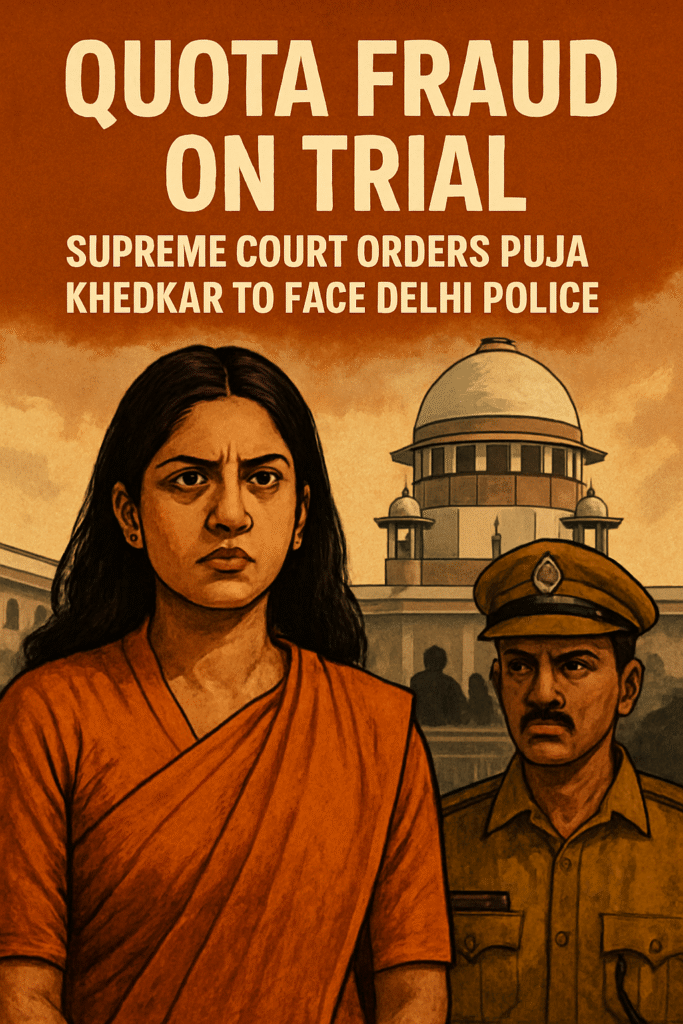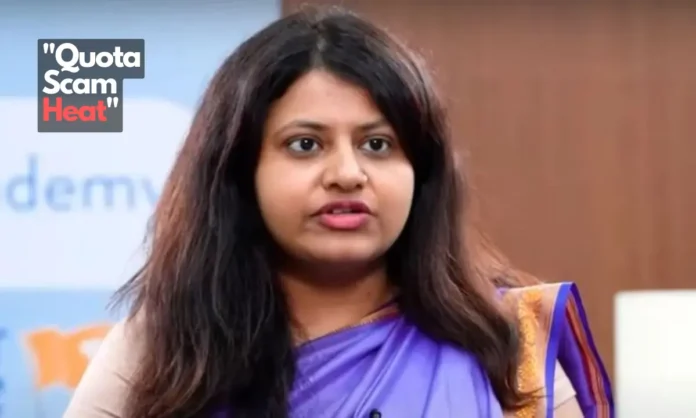Summary
- The Supreme Court has ordered ex-IAS probationer Puja Khedkar—accused of faking OBC and disability certificates for the 2022 civil-services exam—to appear before Delhi Police on 2 May 2025, while shielding her from arrest until the next hearing on 21 May.
- Investigators say custodial interrogation is crucial to uncover a wider network that may have helped candidates forge quota credentials, but the bench flagged the probe’s “lack of concrete progress” nine months after the FIR.
- The case reignites debate over India’s reservation system, UPSC vetting gaps and the legal threshold for custodial arrests when powerful aspirants exploit affirmative-action loopholes.
Reservation or Subversion? The High-Stakes Fallout of India’s Latest UPSC Scam
When the Union Public Service Commission declared the Civil Services Examination-2022 results, few noticed rank 821. Yet that rank carried Puja Manorama Dilip Khedkar—a doctor from Pune—into the elite IAS. Nine months later, she is India’s most talked-about failed bureaucrat. The UPSC’s rare criminal complaint, Delhi Police’s FIR and scathing High-Court orders describe a “classic fraud”: forged OBC certificates, dubious disability papers and a prior medical-college seat allegedly secured under another nomadic-tribe quota.
Now the Supreme Court directive sending Puja Khedkar to Delhi Police marks a critical pivot. Justices B V Nagarathna and Satish Chandra Sharma want answers—fast—yet declined, for now, to let investigators arrest her. The bench’s cautious middle path exposes two colliding imperatives. On one side, law-enforcement insists only custody can break a “larger conspiracy.” On the other, constitutional courts guard personal liberty, wary of turning every white-collar probe into a pre-trial jail term.
Infamous #PujaKhedkar is granted protection from arrest by the Supreme Court over allegations of lying about disabilities and using forged certificates to clear UPSC.
— ShoneeKapoor (@ShoneeKapoor) January 15, 2025
No coercive action till Feb 14.
Means no-one can touch her till Feb 14, not even the police. pic.twitter.com/wIoE3XRKCt
Behind the legal sparring looms a bigger question: How many loopholes lurk inside India’s labyrinthine reservation ecosystem, and who polices the gatekeepers? If an IAS probationer can allegedly game multiple quotas, what does that reveal about verification protocols at every level—from district caste boards to UPSC’s vaunted scrutiny? The coming weeks may determine whether the system tightens or another scandal quietly fades.
Paper Trails & Red Beacons: How the Fraud Allegations Unfolded
- July 2024: UPSC issues show-cause notice and files an FIR after internal checks flag forged caste and disability records.
- Delhi Crime Branch books Khedkar for cheating, forgery and IT-Act offences; a Patiala House court denies anticipatory bail and urges a wider probe into quota misuse.
- Investigators uncover earlier admission to Pune’s Kashibai Navale Medical College under a “Nomadic Tribe-3” quota—raising pattern concerns.
The Charge Sheet So Far
Police say Khedkar produced an OBC-NCL certificate dated 2021, but state records list her family among the politically powerful Maratha group, outside the notified backward classes. A 40 per cent visual-impairment document—key to disability relaxation—allegedly came from a small-town hospital not authorised for UPSC certifications. Forensics experts now examine embedded QR codes and hospital letterheads; a mismatch could add forgery counts.
Adding colour to the controversy, Pune traffic cops photographed Khedkar’s privately owned Audi flaunting a red beacon—long abolished for personal vehicles. Critics seized on the image as symbol of entitlement, further souring public sympathy.
The Courtroom Chess: Liberty, Custody and a “Larger Conspiracy”
- Delhi Police, represented by ASG S V Raju, told the Supreme Court custodial interrogation is “indispensable” to trace document rackets.
- The bench refused immediate custody but warned: cooperation is non-negotiable; bail shields may crumble if she stalls.
- Justices criticised the probe’s snail pace, instructing Delhi Police to “conclude expeditiously.”

Reading the Bench
Justice Nagarathna’s remarks—“no concrete investigation appears to have taken place”—slice both ways. They rebuke police inertia while hinting future leniency is unlikely if progress remains thin. By fixing a hard date (2 May, 10:30 a.m., ACP Crime Branch office), the court has set a ticking clock the agency cannot ignore.
Legal analysts note the order preserves the principle that arrest should be last resort, not default. Since the 2021 Arnesh Kumar judgment, custodial detentions for non-violent, document-based crimes face stricter scrutiny. Yet the bench left the door ajar: failure to hand over originals, evasive answers, or evidence tampering could justify fresh custody pleas on 21 May.
Quota Quake: Broader Ripples for UPSC and Social Justice
- UPSC asked Delhi Police to examine “inside help” that may have eased forged certificates through scrutiny layers.
- Patiala House Court directed cops to scan other recent rank lists for similar abuse—potentially widening the scandal beyond one aspirant.
- Social-justice scholars fear backlash: elite frauds often fuel movements to dilute or scrap reservations, hurting genuine beneficiaries.
- Disability-rights activists demand stricter medical-board oversight to shield legitimate PwD candidates from stigma.
Stakeholder Calculus
For UPSC, credibility is currency. The commission may now mandate blockchain-verified caste and disability records or real-time state-database cross-checks. States, too, face pressure: backlog at caste-verification offices and opaque disability boards create cracks fraudsters exploit.
Politically, the Puja Khedkar Delhi Police appearance 2025 lands amid national election heat. Parties across the spectrum weaponise quota discourse; a high-profile case of alleged quota theft feeds both anti-reservation rhetoric and calls for tighter affirmative-action policing. The outcome could influence how upcoming socio-economic caste census data are legislated.
From Aspirant to Accused: Can the System Learn Before Trust Erodes?
The Supreme Court’s May 2 order is more than a calendar entry—it is a stress test for India’s exam-bureaucracy ecosystem. If investigators unmask a wider forgery network and courts ensure swift, fair trials, the scandal might catalyse reform: digital certificate ledgers, independent medical panels, AI-flagging of suspect documents. If not, cynicism will deepen, reinforcing narratives that the privileged always find backdoors, leaving genuine OBC and PwD aspirants to navigate ever-thicker red tape.
Whether Puja Khedkar emerges as lone forger or linchpin of a quota-fraud cartel, her saga spotlights a fundamental tension in India’s social-justice architecture: the line between empowerment and exploitation is only as strong as the institutions that guard it. The next hearing on 21 May will show if those institutions—police, UPSC, judiciary—are ready to draw that line with new resolve.


